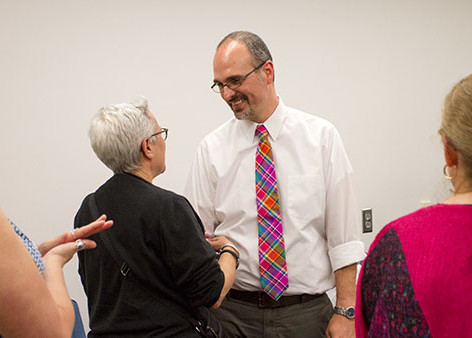A decade of Park scholars will remember Matthew Fee, former Park Scholar Program director from the Roy H. Park School of Communications, who now leaves Ithaca College with a program that has gained a greater national reputation and focus on service.
Fee, who departed the college on Aug. 29, will serve as director of Syracuse University’s Summer College beginning Sept. 2.
Since he joined the program as director in 2004, he has provided the scholars with more academic rigor by initiating the first-year special topics seminar, which is centered around critical communications issues and a required community service component.
Diane Gayeski, dean of the Park School, said the program’s changes have increased the college’s recognition in terms of applications to the school and the program since it first started in 1996.
She said at first the program was thought of as a big scholarship and honor, but now, becoming a part of the program is like joining a community.
Aside from these academic additions to the program, Fee said he also introduced biannual Saturday Seminars and brown-bag lunch discussions for all the scholars because he believes it is important for Park Scholars to academically interact with each other.
“I believed — and still believe — that it’s vital for the Park Scholars to be brought together and to engage on an intellectual level, and not solely on a social, service or media level,” Fee said.
During the Saturday Seminars, the Park Scholars participate in workshops, discuss readings and watch screenings to explore and debate critical issues in the media, according to the website.
Fee said the Park Scholar program not only emphasizes academic engagement, but also focuses on criticisms of the media, service to the community and discussion of social issues.
“The program functions best when it integrates all of those areas, and during my 10 years I have consistently worked towards that integration,” Fee said.
Fee said he wanted the scholars to collaborate across classes, so he revamped the service projects to be ongoing projects from year to year.
Gayeski said Fee organized the service projects to allow upperclassman Park Scholars to work with the underclassman scholars on projects that have already been started.
Tom Bohn, lecturer in the Department of Media Arts, Sciences and Studies, and former dean of the Park School, said the Park Foundation created the scholar program in order to attract more nationally prominent students and boost the college’s academic profile.
“This was an opportunity to not only develop our student body academically, but also diversify it,” he said.
Bohn said the Park Scholar program, which offers students a merit-based scholarship covering the full cost of tuition for four years, started out very small — 10 students in the beginning increased to just 40 after four years.
The college has worked with Fee to make the program more widely known to high schools, specifically to high school media teachers and mentors who are recognized with Spark Media Mentor Awards, Gayeski said.
She said the high school teachers who win the award are given a tour of the college’s campus and are provided with the opportunity to interact with the faculty. In addition, she said the purpose of providing the teachers with these campus interactions is so they can inform their students back home about the rewards of the Park Scholar program.
“That’s actually resulted in a number of people coming to Ithaca College because of those referrals,” Gayeski said.
Junior Park Scholar Taylor Graham said Fee’s contributions to a more structured program have allowed the scholars to connect with the community and the college. He also said Fee’s personality is one reason the Park Scholars are able to communicate and work with each other so well.
“I think that one of his greatest traits is being so personable and being this great figurehead that allows the whole group of Park Scholars to really be a cohesive group and a family,” Graham said.
Senior Park Scholar Crystal Kayiza said Fee’s supportive nature and brilliant mind has redefined what it means to be a Park Scholar.
“As a Park Scholar, you definitely have a lot of responsibility and a unique college experience,” Kayiza said.
Fee said he has no doubts that the next Park Scholar director will continue to develop the program’s service to the community, media relations, academic excellence and leadership.
Although a search committee has yet to be formed, Gayeski said she will meet with administrators over the next few months to develop goals in search for the next director.
The current interim director is Jim Armstrong, founder of the communications company Good for Business. Armstrong will serve through mid-January, Gayeski said.








